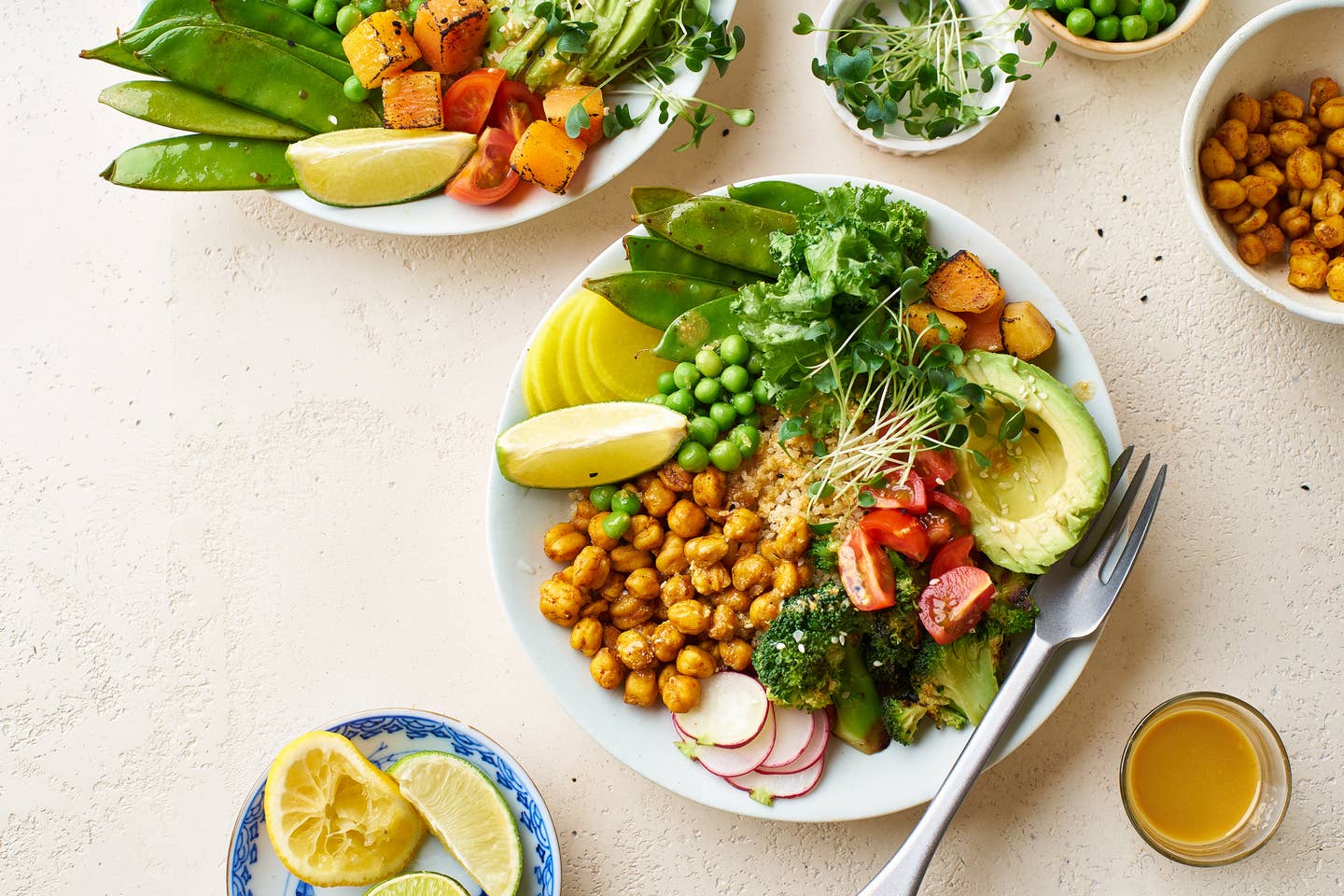
If You Constantly Feel Tired, Our Expert Answers How to Know if You’re Nutrient Deficient
Ensuring that you're getting sufficient nutrients while on a plant-based diet is a contentious subject. Many people believe that there's no way that a diet without animal products can be complete while others believe plant-based is nutrient-dense, and therefore healthiest.
Here, Natalie Rizzo, a New York-based Registered Dietician, tells you how to know that you need to try taking a supplement to boost your energy, mood, and overall wellbeing.
Q: Sometimes I feel I am doing so well and my energy is good but then even with the same diet or just slightly different I get so tired. Could I be deficient in something? How do I know?
A: One of the most common complaints I hear from those who are new to plant-based eating is a lack of energy. This is especially true among fitness enthusiasts since they often are used to burning more calories and sweating out more electrolytes. Many people turn to plant-based eating because they think it will make them feel healthier overall, but then they are disparaged when instead, for a few weeks, they feel lethargic. After all, plant foods like vegetables, fruit, nuts, seeds, legumes, and whole grains are full of vitamins, minerals, and antioxidants, so shouldn’t they give you an energy boost?
If you’re doing it well and avoiding junk food like chips and candy (technically you can be vegan and eat sugar all day long), a whole food plant-based diet should make you feel great and enhance your energy levels. But if you’re not paying attention to getting enough of the right nutrients, you may end up with a deficiency that will zap your energy.
Do you have a nutrient deficiency?
There are certain nutrients you need to pay close attention to on a plant-based diet. Iron and Vitamin B12 are found in meat and dairy, which makes it harder for someone to get on a strictly plant-based diet. But nowadays even plant-based foods are enhanced and infused with these two must-have essential vitamins and minerals, so whether you are using non-dairy creamers or milk, many of them are fortified.
That doesn’t mean you can’t get these nutrients on a plant-based diet, it just means that you need to pay closer attention to the foods you choose. Let’s take a closer look at these nutrients.
Iron
Iron is a mineral that is necessary for the formation of hemoglobin, a protein that delivers oxygen throughout the body. It plays a crucial role in energy metabolism, and working muscles need iron to function properly. Therefore, low levels of iron can cause side effects, like extreme exhaustion, dizziness, headaches, and frequent infections.
The reason that plant-based eaters need to be more cautious about iron is that there are two types–heme and non-heme. Heme iron comes from animal foods, and it’s the type of iron that is most easily absorbed by the body. Non-heme iron comes from plant-based foods, and it’s not as well absorbed by the body.
A review of 27 studies showed that vegetarians are more likely to have lower iron stores compared with non-vegetarians. That said, the authors noted that since high iron stores are related to high animal food intake, those who eat more iron have an increased risk for certain diseases, such as type 2 diabetes. Therefore, the study authors recommend that all types of eaters should consume more plants to control their iron status.
If you think you may have an iron deficiency, ask your doctor to do a simple blood test. They can assess iron status very quickly through a blood draw and advise you on the right supplemental dose to take. Iron is a mineral that can be dangerous in high amounts, so do not take a supplement unless you’re deficient. It also never hurts to eat more of these iron-rich foods.
Vitamin B12
Another deficiency that can wreak havoc on your energy is Vitamin B12. This nutrient plays a role in converting food into glucose to provide energy for exercise, as well as the nervous system, blood, and bone health.
Vitamin B12 is made by microorganisms in the animal’s intestines or diet, which is why the most prevalent sources come from animal foods. Humans are not able to make their own Vitamin B12, and the same goes for plants. Some fermented plant foods, like tempeh, have Vitamin B12 because the bacteria used to make the food also produces the vitamin. But generally, plant foods are naturally lacking Vitamin B12.
That said, many manufacturers fortify plant foods with this vitamin so that plant-based eaters can get enough. Most plant-based milk, breakfast cereals, faux meats, nutritional yeast, and even some grains are fortified with Vitamin B12.
A review of the literature found that Vitamin B12 deficiencies among plant-based eaters can vary wildly. The researchers observed a deficiency range of 0 to 86.5% among adults, with higher deficiency prevalence in vegans than vegetarians.
Luckily, assessing a B12 deficiency is easy as well. Ask your doctor to do a blood draw to determine if your Vitamin B12 blood levels are high enough. If you’re deficient, you may have to get Vitamin B12 injections or take a sublingual B12 supplement to get your levels back up to normal.
Other reasons you might be tired
Of course, there are other reasons you may be tired all the time like you’re exercising constantly and not giving yourself rest days to recover properly. Or maybe you’re not getting enough sleep or you’re drinking too much alcohol, which can interfere with sleep. Whatever the cause, it’s important to consult with a healthcare professional to figure out what’s really going on. If it is diet-related, a doctor or Registered Dietitian should be able to help.
Top 10 Sources of Plant-Based Protein According to a Nutritionist
1. Seitan
Protein: 21 grams in ⅓ cup (1 ounce) Seitan isn’t as popular as other proteins, but it should be! Made from wheat gluten, its texture resembles ground meat. It’s often used in pre-made veggie burgers or meatless nuggets. Seitan has a savory taste, like mushrooms or chicken, so it works well in dishes that call for an umami flavor. With a hearty texture, seitan can be the star of practically any vegan main dish. Add it to stir-fries, sandwiches, burritos, burgers, or stews. Like tofu, seitan will take on the flavor of any marinade or sauce.
2. Tempeh
Protein: 16 grams in 3 ounces If you like a protein with a bit of bite, add tempeh to your list. Made from fermented soybeans, tempeh has a slightly nutty flavor and is pressed into a block. Most varieties include some sort of grains, such as barley or millet. Not only is tempeh a plant-based source of protein, but the fermentation process also creates good-for-your-gut probiotics. You can cut tempeh right off the block and use it as the base for a sandwich or pan-fry it with some sauce. Or, crumble, heat, and make it the star of your next taco night.
3. Lentils
Protein: 13 grams in ½ cup cooked Lentils come in multiple varieties--red, yellow, green, brown, black. Regardless of the type lentils are small but mighty nutritional powerhouses. They pack a good amount of protein as well as iron, folate, and fiber. When cooked, brown lentils retain their texture and can be the base for a grain bowl or make a hearty substitute for ground meat in meatballs, lasagna, tacos or Bolognese. Red lentils are a bit softer and make a nice add-in for a hearty soup, chili, or stew.
4. Hemp Seeds
Protein: 10 grams in 3 tablespoons Hemp seeds are a tender and nutty seed, derived from the hemp plant. They contain good amounts of omega-3s, iron, folate, magnesium, phosphorus, and manganese. They are also a solid source of both soluble and insoluble fiber, which helps to keep your digestive tract healthy and humming. Because they pack a double whammy of protein and healthy fats, hemp seeds can help satisfy hunger, preventing those embarrassing stomach growls as you slog your way to your lunch break. Add them to your morning smoothie or sprinkle them on top of yogurt, oatmeal, or even a salad.
5. Tofu
Protein: 9 grams in 3 ounces (⅕ of a block) Made from coagulated soybeans, tofu is the most popular plant-based protein. Soy is one of the only meatless "complete" proteins, meaning that it contains all of the essential amino acids that the body can’t make but needs for muscle and immune function. With 15% of your daily calcium needs, tofu is also a good replacement for dairy.
6. Edamame
Protein: 9 grams of protein in ½ cup This sushi appetizer is a nutrient powerhouse, so eat it anytime. Edamame is really just another name for soybeans in their pods. Let’s list off some stats--a small ½-cup serving of edamame has 9 grams of protein, 15% of your daily vitamin C, 10% of your daily iron and 16% of your daily fiber. Keep a bag of edamame in your freezer to serve as a fun-to-eat side dish or opt for the shelled variety to toss into salads or a grain bowl.
7. Quinoa
Protein: 8 grams per cup (cooked) Quinoa is an ancient grain and since it's gluten-free a great choice for anyone avoiding gluten. Add it to your burger recipe to create filling texture, or instead of meat in your taco or burrito. Quinoa is among the healthiest foods on the planet, delivering phytonutrients that have anti-inflammatory qualities, so keep it in your pantry for any meal that needs a filling grain. Just remember to soak it and rinse before cooking to get rid of any bitter taste.
8. Black Beans
Protein: 7 grams in ½ cup (canned) Eating beans on the regular might as well be a prerequisite for a plant-based diet. Not only are canned black beans inexpensive, but they also contribute 10% of your daily iron and 25% of your daily fiber to your diet. For less than $1 a can, beans can be the star of tacos, quesadillas, salads, soups, burgers, or dips.
9. Amaranth
Protein: 6 grams in ⅔ cup (cooked) Chances are you’ve never cooked amaranth. But you should, since this tiny, gluten- free grain is packed with almost 30% of your daily fiber and 20% of your daily iron. Cook it like a traditional grain to yield a soft, porridge-like texture. Many people add amaranth to other a hot breakfast cereal mixture, like oats and quinoa. It also pops like popcorn. Toss it in a pot with some oil and wait for it to pop up into a nutritious snack.
10. Peas
Protein: 5 grams in ⅔ cup If peas were one of your most hated veggies as a kid, it’s time to give them another chance. These green beans are a great low-calorie protein to keep in your freezer. Sure, they don’t always taste great when steamed or microwaved (who wants to eat mushy, overcooked peas?), but they do blend well into a yummy puree that can be slathered on toast. To amp up the flavor, add some lemon juice or mint to your mix before you blend.
More From The Beet






